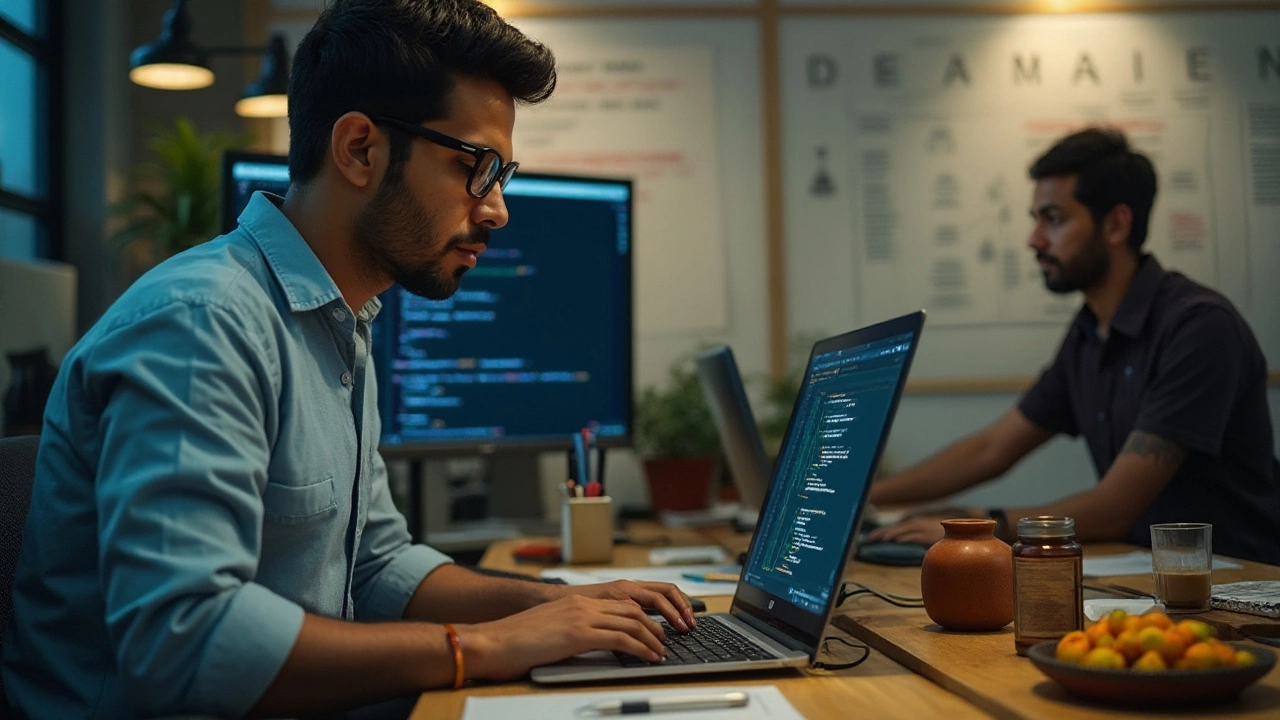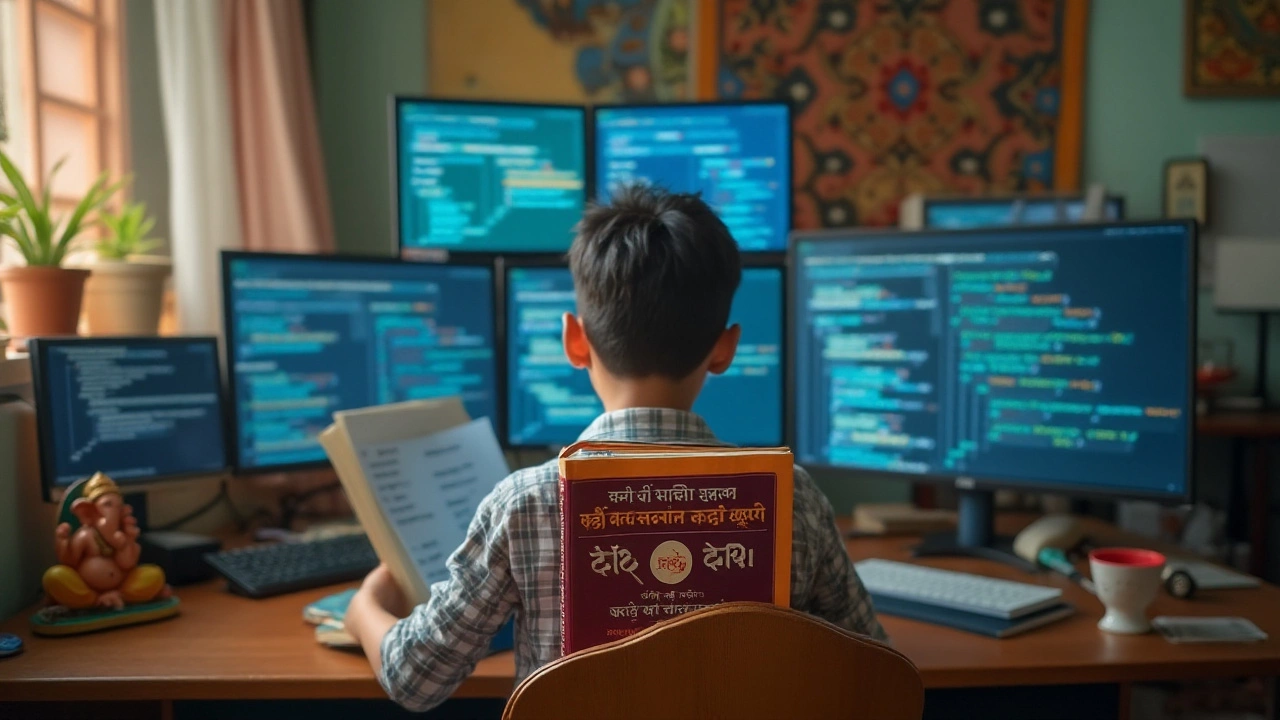The digital world is built upon lines of code and intricate programming, terms often used interchangeably but with meanings that differ substantially. For novices eager to dive into the tech universe, distinguishing between coding and programming is essential. Each fulfills a different role in the creation of software but understanding these differences can set you on a path to becoming a more skilled developer.
Though coding and programming share a common goal of creating software applications, they each serve unique functions within the process. By grasping these distinct roles, beginners can more effectively channel their learning efforts and contribute meaningfully to tech projects. Join us as we delve into these two pivotal components of software development, clearing the fog around these crucial concepts.
- Defining Coding
- Exploring Programming
- Where They Overlap
- Skill Sets Required
- Common Misconceptions
- Choosing the Right Path
Defining Coding
Coding is often considered the very first step in the journey towards developing complex software systems. It involves the act of writing computer programs by translating human ideas into a language that machines can comprehend. Think of it as the lifeblood of any software application, where words and symbols become structured commands that computers can follow. Coders utilize languages like Python, JavaScript, or C++, each suited for different types of tasks, to craft intricate sequences of instructions. This foundational aspect of development requires a delicate balance of logic and creativity, as coders must predict how a program will perform under various scenarios to prevent errors and ensure seamless operation.
The art of coding demands an understanding of syntax and semantics of chosen programming languages, akin to understanding grammar in human languages. Syntax rules dictate the structure of code, while semantics determine the meaning. Without these, the machine cannot interpret human intentions correctly. Coders also engage in debugging—identifying and fixing errors in the code. This process can often be rigorous, requiring a keen eye for detail and patience. An intriguing perspective shared by Steve Jobs highlights the importance of coding, "I think everybody in this country should learn how to program a computer because it teaches you how to think." Such insights emphasize its value beyond technical realms, fostering problem-solving skills applicable in various facets of life.
While coding might appear as simply inputting commands into a text editor, it is underscored by analytical thinking and problem-solving. Coders must consider the logic behind each line, anticipate potential roadblocks, and innovate ways to overcome them. For instance, when developing a web application, coders must write scripts to handle data input and output, ensuring it functions across numerous devices with various screen sizes. Tools like Git and version control systems have become indispensable, helping manage changes in code over time and facilitating collaboration among multiple coders residing miles apart. These tools allow coders to track modifications, experiment without fear of losing valuable work and maintain streamlined communication as projects progress.
Another critical component of coding is understanding and using libraries and frameworks. These pre-written codes provide a massive leap forward in efficiency, enabling coders to implement complex features without rewriting code from scratch. For example, JavaScript frameworks like React and Angular have revolutionized frontend development by simplifying processes and delivering high-performance web applications. As the world becomes increasingly digital, the importance of coding continues to grow, akin to literacy in previous eras, making it an invaluable skill for the future workforce. The demand for coders stretches across industries, from tech giants to healthcare, illustrating the versatile applications of coding skills.
In essence, coding is much more than just writing lines of code. It is a vital skill that equips individuals with the capabilities to construct, innovate, and refine digital technologies. Whether you are creating a new app feature, automating repetitive tasks, or exploring artificial intelligence, coding lies at the heart of these modern advancements. As we dive deeper into this digital age, understanding the building blocks of technology through coding not only broadens career opportunities but also enriches problem-solving abilities and logical thinking.
Exploring Programming
Programming is a comprehensive discipline fundamental to the creation of sophisticated software solutions, encompassing not just writing code but the entire framework of artistic and scientific processes involved in developing robust applications. Unlike coding, which primarily deals with transcribing logic into a language computers understand, programming includes the planning, design, testing, debugging, and maintenance phases. This broader scope means a programmer must possess a diverse skill set, from analytical thinking and problem-solving to an understanding of algorithms and data structures. Over the years, programming has evolved with various paradigms like object-oriented, functional, and procedural programming, each offering unique approaches to problem-solving.
Historically, programming has facilitated major technological advancements. The progress from early assembly languages to contemporary high-level languages like Python and Java showcases an evolution aimed at simplifying the complexity of programming while enhancing its power and flexibility. A skilled programmer must often reconcile artistic creativity with scientific precision to anticipate and solve problems effectively. For instance, when devising algorithms, understanding time and space complexity is essential to ensure applications run efficiently. Programming goes beyond mere writing - it's about creating logical systems that perform tasks reliably and effectively.
Moreover, programming involves collaborating with other developers, architects, and stakeholders, making communication a key skill. This interaction ensures that the final product aligns with user needs and expectations. In this collaborative environment, programmers often use integrated development environments (IDEs) and version control systems such as Git to manage code efficiently. The beauty of programming lies in its ability to bring ideas to life, transforming raw concepts into interactive systems that can impact the world profoundly.
"Programs must be written for people to read, and only incidentally for machines to execute." - Gerald Jay SussmanThis famous quote by Gerald Jay Sussman underscores the essence of programming: writing clear, readable code transcends technical correctness. Structuring code for readability not only aids others in understanding it but also simplifies future debugging and modification tasks. Hence, writing clean, maintainable code is frequently emphasized in programming education and practice.
At the core of effective programming is the software development life cycle (SDLC), a systematic process that guides the creation, testing, and deployment of software solutions. This cycle includes stages such as requirement analysis, design, implementation, testing, deployment, and maintenance. Each phase requires different skills and techniques, challenging programmers to continuously adapt and learn. Adhering to the SDLC principles can dramatically reduce the chances of project failure, improving the delivery of functional, high-quality software.
Programming, therefore, is not just about constructing code but about constructing systems that can solve real-world problems. It's about creating with precision and purpose. The boundaries of what can be achieved with programming are expanding, fueled by innovations in artificial intelligence, machine learning, and cloud computing. As these technologies advance, the demand for programmers who can harness their potential in meaningful ways continues to grow, highlighting the vast and dynamic nature of this crucial field.

Where They Overlap
In the vast landscape of technology, both coding and programming often walk hand in hand, blurring lines yet maintaining roles distinctive enough to warrant separate definitions. At their core, both practices aim to create efficient software solutions that cater to various needs, from simple tasks to complex systems. One could think of coding as the translation aspect, turning human thoughts into instructions that machines comprehend, while programming encompasses a more holistic view, piecing together multiple elements to form a cohesive software solution.
Within this overlapping domain, certain key elements survive as fundamentals shared by both coding and programming. Both require a deep understanding of logic and algorithms to devise solutions that work not only south-bound but also excel in real-world applications. A coder might focus primarily on writing lines of code, but without understanding how these lines fit into the larger scheme of a program designed by a programmer, their work might not reach its full potential. Conversely, a programmer relies on efficient codes to complete projects that are not just operational but optimized for performance.
Moreover, the overlap becomes evident in collaborative environments where coders and programmers work alongside testers, designers, and other tech professionals. Often, these roles may interchange or support each other, emphasizing the necessity for not only writing correct code but interpreting and sometimes rewriting it to improve efficiency and adapt to new requirements. The tools employed in both fields, such as Integrated Development Environments (IDEs) and version control systems like Git, also symbolize the intersection where coding translates into programming through debugging, testing, and refining.
"The best code is no code at all," says Jeff Atwood, co-founder of Stack Overflow, emphasizing simplicity and efficiency as core principles transcending through both domains.
Given the collaborative overlap, the development of soft skills such as communication, teamwork, and problem-solving becomes pivotal. A code's logic is often just as important as its readability because others within a project should be able to understand, modify, or expand it when needed, demonstrating how coding must adapt within the broader scope of programming.
| Aspect | Coding | Programming |
|---|---|---|
| Main Focus | Writing code | Designing software |
| Tools | IDEs, Text Editors | Debuggers, Profilers |
| Outcome | Source Code | Complete Program |
The distinction yet inevitable overlap between coding and programming benefits both professionals and the projects they contribute to. Whether crafting simple scripts for automation or orchestrating large-scale software solutions, recognizing where these roles intersect empowers tech enthusiasts to enhance their skill sets. Understanding this interplay equips one with a balanced approach, welcoming challenges whether small in scale or monumental, ultimately leading to more robust, reliable, and versatile technological advancements.
Skill Sets Required
Diving into the realms of both coding and programming demands a variety of skill sets, each tailored to specific aspects of software development. When it comes to coding, it's crucial to have a strong grasp of different programming languages such as Python, Java, or C++, depending on your project needs. Understanding syntax, learning how to write clean and efficient code, and mastering the logic behind these languages are foundational skills every coder should possess. Additionally, being detail-oriented helps in identifying errors in the code, debugging efficiently, and ensuring the software runs smoothly.
On the other hand, the required skills for programming extend beyond the basics of coding. A programmer must be able to conceptualize the big picture -- including designing the architecture of systems, determining the necessary tools and technologies to use, and effectively managing time and resources. Problem-solving is a pivotal skill here. Programmers are often tasked with identifying complex issues and developing step-by-step plans to tackle them. This role also demands a good understanding of algorithms and data structures which are essential for optimizing solutions and handling vast amounts of data efficiently.
While both coders and programmers need a robust technical background, these roles often require soft skills too. Excellent communication skills help both to articulate plans and solutions and to collaborate with team members effectively. The ability to work within a team is essential as most projects are not isolated efforts. Creativity proves significant as well, since coming up with innovative solutions to technical problems can set apart a traditional coder from one aspiring to excel. A continuous learning attitude is highly beneficial as the tech field is perpetually evolving, introducing new languages, tools, and methodologies.
"Technical skills may get you the job, but soft skills can help you keep it," says Augustine Reyes, a veteran software developer and author, highlighting the importance of soft skills in the tech industry.
The skill sets needed for coding and programming are thus uniquely demanding and richly rewarding. Both require a balance of hard technical skills and soft interpersonal abilities to thrive in the fast-paced world of technology. Success in either field calls for adaptability, a love for new challenges, and a relentless desire to push the boundaries of what software can accomplish. Strengthening these skills paves the way to flourishing as either a coder or a programmer, or both, opening doors to exciting opportunities in the digital age.

Common Misconceptions
The tech industry, known for its jargon and fast pace, often results in many misconceptions, especially when it comes to terms like coding and programming. One widespread myth is that coding and programming are identical. This belief often stems from the way both activities require writing instructions for a computer. However, while coding focuses on writing the actual code in a chosen programming language, programming encompasses a broader scope of developing an entire solution; it includes not only coding but also problem analysis, algorithm development, and debugging. Understanding this distinction is vital, akin to knowing the difference between learning vocabulary in a language and being fluent in it.
Another common myth revolves around skill levels required where many novices believe coding to be a lesser skill requiring minimal understanding. To be effective in coding, one must master syntax and logic within a language, which serves as a strong foundation for software development. In contrast, programming involves building a deep understanding of data structures, algorithms, software design principles, and project management, thus extending beyond mere coding. "Programming today is a race between software engineers striving to build bigger and better idiot-proof programs, and the universe trying to produce bigger and better idiots," as Alistair Cockburn humorously put it. This quote underscores the breadth and complexity of programming beyond plain coding.
A misconception also exists about the necessity of formal education for becoming proficient in either coding or programming. While traditionally many sought computer science degrees, today's landscape has shifted significantly. Countless successful developers are self-taught, having used online resources, coding boot camps, and personal projects to gain their expertise. While formal education offers a comprehensive introduction to theoretical concepts, the emphasis lies in practical experience and continuous learning. Resources like GitHub play a pivotal role, offering aspiring developers a platform to practice and showcase their skills.
It's also essential to address the myth that more lines of code correlate with better quality software. In reality, effective code is succinct and optimized for performance – a notion that every skilled programmer understands. Quality often comes down to understanding the problem, devising a well-structured solution, and utilizing code to execute that plan efficiently. An interesting statistic from a study by the Standish Group indicated that 77% of complex software projects fail or are challenged, highlighting that success often hinges not merely on the code itself but on broader programming practices, including planning and management.
Choosing the Right Path
Deciding whether to delve into coding or leap directly into programming can be a daunting choice for newcomers. It’s akin to choosing between learning the alphabet and jumping straight into writing complete sentences. Both paths require a unique set of skills and mindsets. Coding, often viewed as the foundation, involves writing scripts in languages such as Python, JavaScript, or HTML to communicate with computers. It's crucial because it teaches the syntax and logical structure necessary for all kinds of software development. If you're a beginner, starting here could be beneficial as it demystifies the language of computers, allowing you to grow in confidence with every line of code you write.
On the other hand, programming broadens the horizon further. It’s not only about writing code but involves designing systems, solving complex problems, and more critically, thinking about how a user might interact with your software. Understanding frameworks, managing databases, and diving into operating systems are just a fraction of what a programmer deals with. Entering programming might require some groundwork in coding first, but it covers many more aspects, offering you the chance to work on larger projects with more significant impact.
Considering Your Interests and Strengths
Your personal interests play a significant role in choosing the suitable path. If you have a knack for detail and enjoy the process of getting immediate feedback from the lines you type, coding could be your calling. It's often seen as more straightforward to pick up, especially for hobbyists or those interested in web development or scripting tasks. However, if you thrive on big-picture thinking, enjoy integrating various systems, and love devising solutions to multi-faceted problems, then programming might suit you better. It's perfect for those aspiring to create full-fledged applications or even aspire towards roles like software architecture.
"The function of a good software developer is to make a complex task simply for the user," - Grady Booch, a well-respected figure in the world of software engineering.
Both fields are rich in demand, with the need for proficient developers steadily rising. According to a 2023 report by the Bureau of Labor Statistics, employment in software development is expected to grow by 22%, which is significantly faster than the average for all occupations. This surge indicates a promising future, lucrative opportunities, and a vast array of industries welcoming those with the right skills.
- If you love finding solutions and are often curious about how things work, starting with coding can help you build the fundamentals.
- If creating innovative systems excites you and you have a strong grasp of logical and analytical thinking, diving into programming could be your best bet.
In the end, your pathway may not need to be a single choice. Many professionals suggest blending both approaches. Start with coding to get a strong technical foundation, then gradually take on the broader tasks involved in programming as your understanding deepens. This hybrid approach can often be the key to unlocking the world of software development, allowing you to enjoy the best of both worlds and advance as a well-rounded developer.
